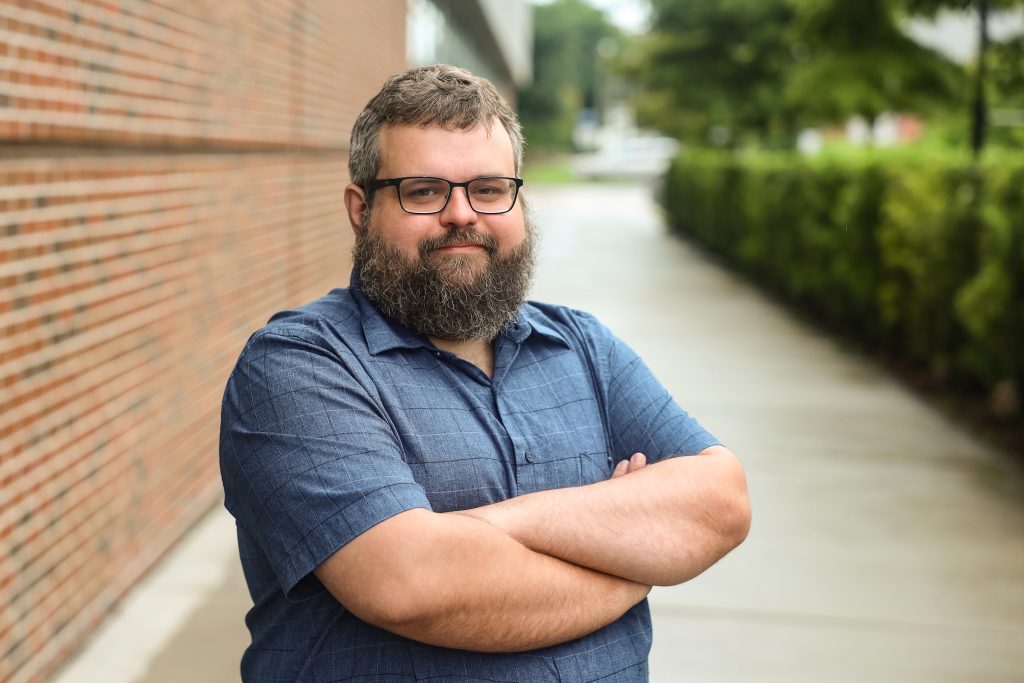Employee Spotlight: Paul Markert

We are thrilled to welcome Paul Markert as the new Program Director for the Simulation and Game Development program at Cape Fear Community College. With a rich background in media design and a passion for game development, Paul is set to lead our program into an exciting future.
Get to know more about Paul through our Q&A session below!
Q: Can you tell us about your professional journey and what led you to the field of gaming and simulation?
Paul: I started my professional life doing theatre in New York. Striving to make the biggest shows I could, I became very interested in media design, which ultimately led me to get my Master of Fine Arts at the University of Georgia. My degree, which was in Dramatic Media, focused on the intersection between technology and story. This new environment, plus a lifetime love of video games, led me to study and, ultimately, teach game development as the focus of my Master’s.
Q: What are some of the most exciting projects you have worked on in your career?
Paul: For my thesis, I solo developed a game called Rolly Stories. The player takes control of a robot trying to escape a post-apocalyptic junkyard. Players discover new power-ups, solve puzzles, and discover the mystery of what happened to the world. In my spare time, I am also developing a new shooter/roguelike where the players’ clothing is a weapon as they strive to become the best dressed in the city.
Q: What attracted you to Cape Fear Community College and the new Gaming and Simulation program?
Paul: Being able to build something from the ground up was an exciting proposition. North Carolina is also home to so many great game and simulation companies. It feels like a fantastic opportunity to prepare a new generation of developers for jobs in the field.
Q: What is your vision for the Gaming and Simulation program, and what do you hope to achieve in the first year?
Paul: Ultimately, I hope to create a community of developers and designers ready to take on careers in the industry, but can also create solo projects or projects with each other. In the first year, I hope to provide classes to familiarize students with the necessary software. I also plan to reach out to companies in the state to speak to students.
Q: What advice would you give to students who are passionate about gaming and simulation but unsure about their career path?
Paul: Build your own projects! Besides what you learn in the program, the fastest way to master development is creating your own work. Though the software can be daunting initially, the best thing you can do is experiment. If something doesn’t work, that’s a great learning opportunity to figure out why.
Q: Can you share a bit about your personal interests or hobbies outside of your professional work?
Paul: Not very surprising, but I spend a lot of time playing games! I’m always playing a few video games (currently Baldur’s Gate 3, Warframe, and Age of Wonders 4). I am also a part of a couple of Dungeons & Dragons campaigns and collect board games.
Q: How do you see the field of gaming and simulation evolving in the next five years?
Paul: One of the positives of AI is the removal of many tedious tasks that once existed in simulation and development. For example, multiple programs can now instantly rig and properly skin-weight a model for animation. Epic has developed software to turn a video of a person’s head into a riggable 3D model. Though the time between idea and execution may be shortening, what makes projects engaging will always remain the same. That is a core understanding of development and structure. Also, post-Covid, the need to be in a major city to be involved in the industry is slowly disappearing as more remote work seems to be on the horizon.
Q: How do you plan to involve the local community in the Gaming and Simulation program at Cape Fear Community College?
Paul: I can’t wait to meet everyone in the eSports Club! The end of the SGD Design I course, offered this September, will culminate in each student creating their own simple game. If the students feel comfortable, I would love to invite the Cape Fear community to test them out. In the long term, I would love to start some CFCC-focused gamejams. Gamejams are short game-making competitions where individuals or groups come together to make games in a limited timeframe. This would be an excellent opportunity for students to come together and implement their new skills in a fun environment.
Q: Is there anything else you would like the Cape Fear Community College community to know about you or the new program?
Paul: Everyone I have met in my short time so far at Cape Fear Community College has been incredibly kind, encouraging, and excited to be here. This is a fantastic place to be, and I can’t wait to begin classes.

